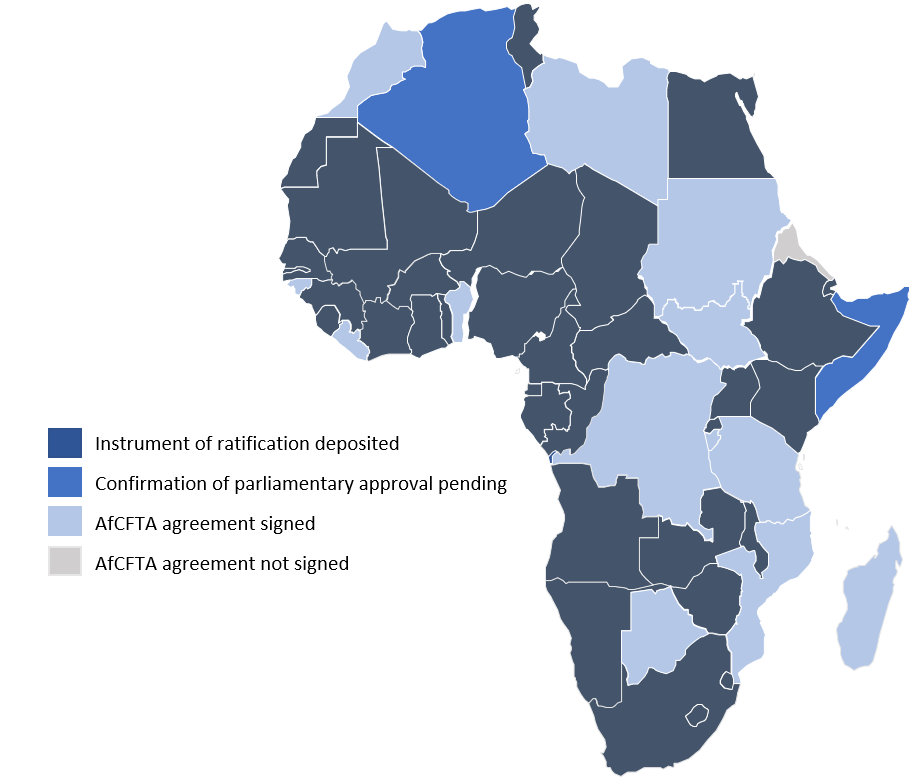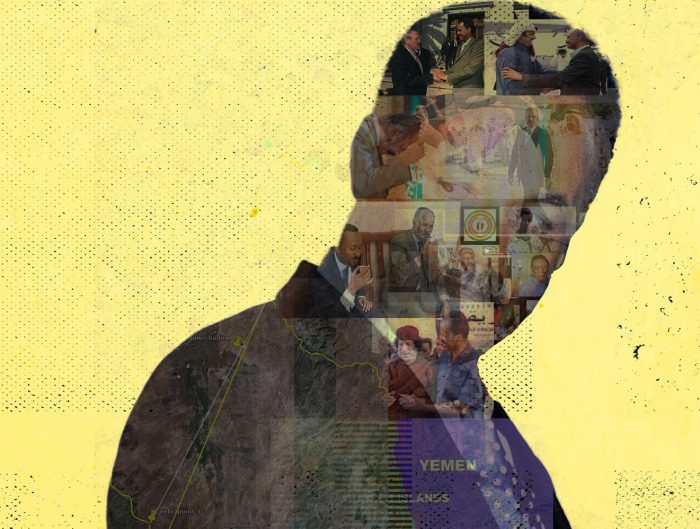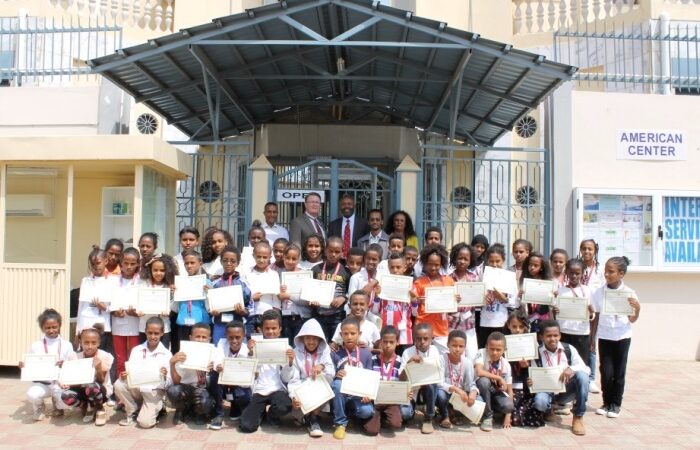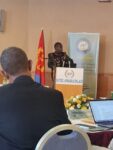On April 29-30, Eritrea’s Ministry of Justice hosted a conference at Hotel Asmara Palace entitled “Values & Justice” purportedly to integrate “Eritrean values” to its legal framework. We will save why this is “purportedly” and not real for later, but for now we will address the address given by one of the invited guests: Professor PLO Lumumba.
A few words about Lumumba: he is a Kenyan Pan-African who has held governmental posts (commissions and universities) but is mostly famous for his anti-colonial and anti-neo-colonial speeches which endears him to all those who want us to forget what life is like for Africans living in the post-post-neo colonial period, and who is to blame for it. Naturally, supporters of Eritrea’s One-Man Governance (Manocracy) are huge fans of the Professor and are constantly sharing his “Why I Hate Colonialism” speeches. He doesn’t call his speeches that, but they are all about absolving African rulers from their maladministration. He is one of those African intellectuals who travels from “one 5-star hotel to another 5-star hotel”, in his own words, to give his stump speeches, knowingly or unknowingly absolving all dictators of their dictates because, hell, at least they are not colonialists! Also, he has a black belt, and he hates the gays.
Lumumba in Asmara
He wasn’t the only person who addressed the gathering. But the addresses of his fellow-travelers were so banal, so cliched and substance-free, lacking any executable recommendations, they are impossible to remember much less digest. Thus, the focus on him. Lumumba’s recommendations to African leaders, and by extension Eritrea, are:
- African Universities’ law schools should teach the African Charter on Human and People’s Rights.
- African nations must incorporate their own customary laws, other African customary laws, as well as international treaties into their penal codes.
- African countries must rely on African media to tell their narratives.
- African countries must carefully monitor the implementation of African Continental Free Trade Area (AfCFTA) treaties lest they be swindled.
- Africa must make its own goods (notebooks for God’s sake) instead of importing them.
They are all excellent recommendations. But what was missing was, in his own words, was the ability to “adapt, adapt, customize” his speech for Eritrea. It is a generic one he gives at every 5-star hotel. He appears not to know or not care about the record ( “prior”, in penal code terms) of his hosts. He may have good or bad reasons for not pointing them out. He might be playing the long game, or their self-declared self-reliance and other bromides, and their hatred of a joint enemy (America) may have blinded him from doing any due diligence and, in the process, he came across as just another African mercenary in the service of the Authoritarian State. We will know which one it is after we watch the inevitable post-conference interviews. For now, on the rare chance he doesn’t know:
- African Charter & African Commission Human & People’s Rights (ACHPR)
You have to have a university to have a law school and Eritrea has colleges, not universities. It is a short story: thousands of educated youth milling about in the capital city was just an invitation to agitation, so the university had to be closed. Now, it is not even clear if the law school exists. But assuming it does, it will never teach the African Charter because law schools tackle case laws. One of the cases that came in front of the ACHPR was No. 250/2002 (2003) when Liesbeth Zegveld and Mussie Ephrem (an Eritrean residing in Sweden) successfully sued the Government of Eritrea for unlawfully detaining 11 Eritreans (G-15.) The matter was litigated and ACHPR:
- Finds the State of Eritrea in violation of Articles 2, 6, 7(1) and 9(2) of the African Charter on Human and Peoples’ Rights;
- Urges the State of Eritrea to order the immediate release of the 11 detainees, namely, Petros Solomon, Ogbe Abraha, Haile Woldetensae, Mahmud Ahmed Sheriffo, Berhane Ghebre Eghzabiher, Astier Feshation, Saleh Kekya, Hamid Himid, Estifanos Seyoum, Germano Nati, and Beraki Ghebre Selassie; and
- Recommends that the State of Eritrea compensates the abovementioned persons.
The was in 2003, two years after their arrest. Twenty-one years after the ruling, the detainees (G-15) remain in prison or are presumed dead. There is no information about them because asking about them can result in one’s sudden disappearance. Their families remain in agony. And the 11 detainees listed are but a fraction of a fraction of the number of Eritreans detained because the only things the Eritrean government considers sacred are two colonial leftovers: territorial boundaries and prisons. It went to war with its neighbors on the first; it has been going to war with its own citizens on the second.
2. Customary Laws & International Treaties
The professor argued that one should not dismiss treaties and their instruments because a lot of care went into producing them. Truth! The government of Eritrea has signed and ratified many international treaties including Convention on the Right of the Child (1994), International Covenant on Civil and Political Rights (2002), and Convention Against Torture and Other Cruel, Inhuman or Degrading Treatment or Punishment (2014.)
While it marks international Right of the Child Day every November, it still imprisons children (see also: Ciham Ali); it still takes them (at 16 and 17) to a single high school in a desert, a school which is run by military officers who introduce them to the conveyer belt that it is to take them from life as a student to a life as a soldier on indefinite conscription. In fact, the goal is to produce a “Stuoldier” (Student + Soldier), not in the service of the colonizer (yay!) but the local tyrant (boo!) Refer to the testimony-from-exile of two Eritreans, male and female, in A Day In The Life of Sawa High School, with special focus on how old they were when they were taking military training.
The International Covenant on Civil and Political Rights has 27 articles (dealing with rights) and the Eritrean government violates every single one of them, every day.
As for torture and other cruel, inhuman or degrading treatment or punishment, not too far from the 5-star hotel Lumumba stayed at, the good professor can find plenty of it in regular and irregular prisons where people are housed, undergoing physical and mental punishment every day, often without a day in court, often without family visitation rights, sometimes in shipping containers or underground, sometimes for decades. It has re-purposed and multiplied and put on steroids a colonial institution: prison. It is not without cause that 1/7 of Eritreans have been escaping to exile and, no, it is not economic. It is prey running from predator.
It is not without cause that the Government of Eritrea was accused of committing Crimes Against Humanity in 2015 and it was the last-minute intervention by the USA (yes, the good ol’ USA) that saved it from referral to the International Criminal Court in 2016. You will recall that USA objected to the UNHRC’s recommendation to refer the ruling elite of Eritrea (civilians and generals) to International Criminal Court (ICC) for committing crimes against humanity because the report of the Commission of Inquiry lacked “sophistication and precision”, per a Reuters report. Not because it didn’t believe they didn’t commit crimes against humanity: the US made the case for it throughout the Human Rights Council process. The reversal was due to USA’s rationale that, no doubt, came straight from Cosa Nostra: Isaias Afwerki is “a friend of a friend,” with Saudi Arabia & UAE as the mutual and critical friends. He works against our interest on everything, but he is a reliable custodian of our primary interest, his Red Sea. And that’s everything.
As for customary laws, they have been around in Eritrea for hundreds of years and the government has been in power for 33 years. Why is it a subject now, in 2024, nine years after the Penal Code, allegedly composed after great reference to customary laws, was announced with great fanfare (in English not in Eritrea’s working languages, clearly hinting at the audience) in 2015? That will be in the conclusion to this article.
3. African Media
Professor Lumumba was unhappy that his TV channel selection at Hotel Asmara Palace (if he had ever been able to turn on the TV, he said) included CNN and BBC. He finds that objectionable, since Africans are not able to tell their narratives. He prefers African TV. True, CNN and BBC suck, but not as badly as African TV which, for the most part, is a homage to the government: its “achievements” celebrated (hear ye! hear ye!), and its trespasses hidden. The call for African TV is empty unless it is accompanied by a call for empowering the private press. Specially in a country which has enforced the disappearance and exile of all private journalists and has suspended the 1996 Press Proclamation (“temporarily”, it said) for 23 years.
4. African Continental Free Trade Area (AfCFTA)
As for the Professor’s call for Africa to scrutinize AfCFTA, I am sure he is aware Eritrea is the only country in Africa that has not signed AfCFTA. Not only has it not signed it, but it also feels it is under no obligation to explain why because there is no opposition party, no civil society, no private press, no Eritrean parliament, no Eritrean Cabinet of Ministers, nor even an Eritrean ruling party congress to debate it. It is a nation running on neutral.

5. Self-Reliance and Indonesian Imports
Professor Lumumba is one of the intellectuals who uses every occasion as a fact-finding mission. At least that’s my understanding of him. He is not an ivory tower intellectual, but a public intellectual who engages. It did not escape his notice that the notebooks distributed at the conference were not made in Africa, much less Eritrea. He marveled at the fact they were made in Indonesia.
Here’s the piece he may be missing. The Italians left Eritrea with small-scale industrialization that was unparalleled anywhere in Africa. Not only are his hosts, the government of Eritrea, incapable of introducing a new industry, they are incapable of maintaining what they inherited because of a series of policies they pursued that chased off capital–domestic and foreign. The people that could have created a paper/stationery company are all exiled, some prospering, all over Africa including Uganda, South Sudan, Angola, and even in his hometown Kenya. Here’s the president of Eritrea, in his own words, telling us what happened to the Italian era industries, not like a man who presided over it, but like a consultant hired by an investment bank to report on it:
https://x.com/eritreadigest/status/1287166217388580865?s=46&t=ANYRxUKCME3NJXq4ZeBhgA
6. Purportedly
Here are some reasons to be skeptical about the government’s claim that the purpose of the conference was to consult experts so that it can integrate customary laws into its penal code.
Firstly, while many of the customary laws are a relic of the past (for example: reconciling rapist with victim by arranging marriage) and should remain in history books not government offices, the ones which deal with governance and justice are superior to, and at direct odds with, the ruling party’s dogma or what it proudly calls its “culture.” This is a new culture–of secrecy, bullying, intimidating, scaring people to submission, carrying out revolutionary justice–which is at odds with customary laws–of consultation in governance, and due process and fairness on matters of justice. The two are irreconcilable. Thus they must be absorbed into the PFDJ Culture now renamed “Eritrean Values.”
Secondly, one needs to know the sequence of events of what preceded to gauge what is likely to happen. Prior to Eritrea’s ratification of its constitution in 1997, it was relying on a modified version of Ethiopia’s imperial penal code and a series of “proclamations” it published. Following the ratification of the constitution, all proclamations (written and unwritten, including its “special court”) were supposed to be reviewed to ensure they are compliant with the constitution. A series of self-inflicted wounds–war with Ethiopia, UN sanctions for the government’s disastrous missions in Somalia and Djibouti and worst of all, personal animosity to the chief drafter of the constitution (Professor Bereket Habteselasse) and the government’s pettiness towards him, resulted in the RATIFIED constitution being ignored. Then, officially, pronounced dead in 2014.
In 2015, the Eritrean government issued its Civil and Penal Codes and Procedures for external consumption only, and that’s why the English edition preceded the Tigrinya and Arabic versions–a reversal of all prior practices. Why? The government officials were in a state of panic, because they were being considered for referral to the International Criminal Court by the UN Human Rights Council. Recall the dates: The 2015 penal code was citing a recently murdered constitution as a source of its authority. The death announcement was made by the president to a nervous State TV reporter (“African TV”!) along with the obligatory false promise: it’s all cool, man, its replacement is being worked on, but I wont call it a constitution but “bylaws of governance.” It is still being “worked on” 10 years later. (Source: Eri-TV) There was no follow-up question. Does any of the above indicate to you that the Eritrean Government is serious about justice or customary laws when it comes to its penal code or whether it will pay any attention to it even if it modifies it to please external audiences?
Thirdly, one needs to remember what is happening in the PFDJ calendar of court appearances in its long-running UNHRC “dialogue.” Every year, it denies that it has any flaws in its justice system but, it concedes, to the extent it has issues, it is due to lack of capacity. We need money. The UN (which has 12 agencies in Asmara all within walking distance of the 5-star hotel) invests heavily in capacity-building in this oh-so-self-reliant country of ours. And the seminar, which the professor lent his star power to, will appear in the government’s next self-report to UNHRC so congratulations, Professor, for your role.
Fourthly, the government is very fond of teasing the people every Independence Day, I mean Month, that it is about to reform, it is about to “pardon” prisoners, it is about to introduce a constitution (the 2014-teased constitution was first announced at Independence Day address by the president.) This is more of the same: time will tell very, very shortly.
Eritrea will survive what Comrade Vladimir Lenin called “useful idiots”: they come and go. But they do delay the long-overdue correction when they keep legitimizing an illegitimate government. In fairness to the Professor, most professors make judgements about a country based on the writings of professors in a given country whose worldview they agree with. Post-PFDJ Eritrea has not produced professors that can espouse their views without censoring themselves to the level of an entry-level cadre. That, too, is a reason to be skeptical of the government’s never-ending promises to reform that never materialize.





Leave A Reply